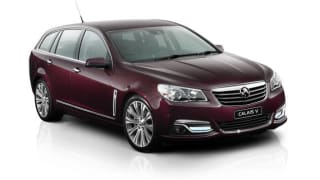
Holden Commodore Calais V Sportwagon 2013 review
We turn the spotlight on the car world's newest and brightest stars as we ask the big questions, including the one that really needs answering -- would you buy one?
Browse over 9,000 car reviews
A four-cylinder Falcon, eh? Sounds like the ‘big bird’ has had its wings clipped. Nothing could be farther from the truth.
The complete Ford Falcon EcoBoost range is FG Falcon Mk II EcoBoost XT at $37,235, FG Falcon Mk II EcoBoost G6 at $40,835 and FG Falcon Mk II EcoBoost G6E at $46,735.
The Falcon EcoBoost joins the Kuga TE and Ranger PX 4x2 and 4x4 in Ford’s capped price servicing and 12 months myFord standard roadside assistance. Details are available on the Ford website that provides customers with the maximum price they will pay for a standard A or B logbook service for an eligible vehicle at participating Ford dealers.
The much loved traditional Aussie large family ‘six’ has been fitted with a 2.0-litre four-cylinder motor as part of Ford’s world-wide roll-out of its EcoBoost family of high-tech, low-emission power plants.
Apart from Ford’s 2.0-litre direct-injection four cylinder in the Falcon and 1.0-litre three-cylinder, set to appear Down Under in the EcoSport sports utility vehicle in 2013, the EcoBoost family also includes a 1.6-litre I-4 and 3.5-litre V6. Plans call for an EcoBoost engine to be available in more than 90 per cent of the company’s global nameplates by 2013.
The new Falcon engine combines common-rail direct fuel injection, turbocharging and variable valve timing to produce the best performance and torque while improving fuel economy and cutting carbon dioxide emissions. The Falcon becomes the first rear-wheel drive vehicle to be fitted with Ford’s global high-tech EcoBoost engine which will be available on Falcon XT, G6 and G6E at no additional cost.
The EcoBoost engine continues to provide Falcon drivers with the performance they demand from a big car. Official power and torque figures claimed are 179 kW at 5500 rpm and a substantial 353 Nm between a low 2000 to 4000 rpm. Built in Valencia, Spain, the engine when fitted to a Falcon XT has consumption of just 8.1 litres per 100 kilometres on the combined urban/highway cycle, an 18 per cent improvement over the standard in-line six-cylinder engine.
Falcon G6 and G6E are also given a boost with fuel consumption of 8.5 L/100km – a 14 per cent improvement – while CO2 emissions are bettered by 14.8 per cent to just 201 g/km compared to the 4.0-litre in-line six-cylinder. Ford is also working on the introduction of engine stop-start technology aimed at cutting the motor when the vehicle is stationary, for example, at traffic lights, thus saving even more fuel.
Further efficiencies are obtained through weight savings. The new engine is down a substantial 74 kg over the six-cylinder XT. Improved aerodynamics by way of an engine undertray are another factor in the decrease in fuel consumption, as is the fitting 16-inch low rolling resistance tyres to the Falcon XT.
Like the rest of the FG Falcon MkII range, the Falcon EcoBoost takes advantage of an upgrade of features that includes a new 8-inch colour touch screen with integrated audio and phone functions as well as satellite navigation on the G6E series. On the down side, Ford says towing should be maximised at 1600 kg as opposed to 2300 kg with the bigger capacity engine.
The cabin is quieter thanks to an acoustic windscreen, inner and outer dashboard insulation, an under-bonnet sound absorber, improved engine and transmission mounts and insulated transmission tunnel.
The Falcon MkII also carries a comprehensive occupant protection and security package that includes dual front, side thorax and curtain airbags, Dynamic Stability Control, rear parking sensors and driver fatigue warning system.
Ride and handling are what we have come to expect from an Aussie car with local engineering input. Cold weather and altitude testing were conducted at Mount Hotham, with Falcon EcoBoost sedans also being used in towing tests. The suspension has been upgraded, with spring and damper rates tuned for both XT and G6 models, while the XT enjoys a 13 mm lower ride height.
On a race track straight-line sprint from a standing start during the Falcon EcoBoost launch, the XT hit 100 km/h around the seven second mark. On the road it was hard to tell – apart from a rather pleasant turbo whoosh – the power plant was a four-cylinder force-fed unit, not a bigger ‘six’. Pedal response when overtaking was as good as a ‘six’, with negligible turbo lag.
How will the Falcon ‘four’ be taken up by rusted-on six-cylinder large family car enthusiasts? Get their bums on seats in the EcoBoost-powered Falcon; drive them around and spend the petrol-pump savings on them. Job done.
| Vehicle | Specs | Price* | |
|---|---|---|---|
| (base) | 4.0L, ULP, 6 SP MAN | $8,250 – 11,550 | 2012 Ford Falcon 2012 (base) Pricing and Specs |
| R6 | 4.0L, ULP, 6 SP AUTO | $8,030 – 11,330 | 2012 Ford Falcon 2012 R6 Pricing and Specs |
| (LPI) | 4.0L, LPG, 6 SP AUTO | $12,760 – 16,940 | 2012 Ford Falcon 2012 (LPI) Pricing and Specs |
| R6 (lpi) | 4.0L, LPG, 6 SP AUTO | $8,690 – 12,210 | 2012 Ford Falcon 2012 R6 (lpi) Pricing and Specs |
$6,988
Lowest price, based on 134 car listings in the last 6 months